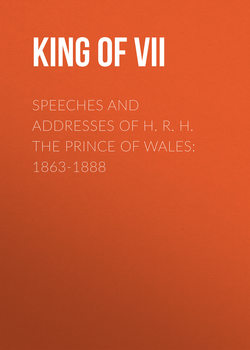Читать книгу Speeches and Addresses of H. R. H. the Prince of Wales: 1863-1888 - King of Great Britain Edward VII - Страница 20
ROYAL NATIONAL LIFE-BOAT INSTITUTION
ОглавлениеMarch 1st, 1867
In a maritime country like this, with seas crowded with shipping, and with coasts dangerous from rocks or shoals, a lifeboat service for preservation of life from shipwreck is a necessity. The Royal National Life-boat Institution meets the want. It has now, in 1888, nearly 300 stations, all round the coast. The wreck chart, which is published annually with the Society's Report, shows at a glance where wrecks are most numerous, and there the boats of rescue are most required. It is not only British coasting vessels that are thus provided for, but the ships coming from foreign seas, and of all nations, as they crowd towards our estuaries and ports, benefit by the lifeboat service.
On the 1st of March, 1867, the Prince of Wales took the chair at the annual meeting of the Institution held, through the courtesy of the Lord Mayor, in the Egyptian Hall of the Mansion House. Received in the State Drawing-Room, by the chief magistrate of London, attended by the sword and mace bearers of the Corporation, the Prince was thence conducted to the Hall, where a numerous and distinguished company had assembled. On taking the chair, the Prince said: —
"My Lord Mayor, my Lords, Ladies, and Gentlemen, – It affords me very great pleasure to occupy the chair to-day, upon so interesting an occasion as the present. Among the many benevolent and charitable institutions of this country there are, I think, few which demand our sympathy and support more, and in which we can feel more interest, than the National Life-boat Institution. An institution of this kind is an absolute necessity in a great maritime country like ours. It is wholly different in one respect from other institutions, because although lives are to be saved, they can in those cases in which this society operates only be saved at the risk of the loss of other lives. I am happy to be able to congratulate the Institution upon its high state of efficiency at the present moment, and upon the fact that by its means very nearly one thousand lives have been saved in the course of the past year.
"Lifeboats have been given by many benevolent individuals – some as thank-offerings from the friends of those whose lives have been saved, and others in memory of those who are unhappily no more. I am happy also to be able to say that lifeboats do not only exist upon our coast, but that our great example in this matter has been imitated by many foreign maritime countries, and they have chosen our institution as the model for their own. I beg upon this occasion to tender, in the name of the Institution, our warmest thanks for the kindness and courtesy of the Lord Mayor in allowing us to hold our meeting in this hall. It is indeed a peculiarly fitting place in which to hold such a meeting, closely connected as the Institution is with the City of London. Very nearly half a century ago the Institution originated in this city. In 1850 the late Duke of Northumberland became its president. My lamented father was also a vice-patron, and took the warmest interest in its prosperity. I am happy to say the respected secretary, Mr. Lewis, occupied that position at that time, as, indeed, he had long before that time. He has held it ever since, and much of the success of the Institution is owing to his long experience, and the energetic manner in which he has directed its working has raised the Institution to its present high state of efficiency.
"I may say that there are 174 lifeboats afloat, and that in the course of the past year 33 have been called into existence, at a cost of no less than £17,000, the whole of which has been defrayed by benevolent individuals. Before concluding the brief remarks which I have addressed to you, however imperfectly, upon this occasion, I call upon you once more to offer your support to so excellent an Institution. I am certain you must be convinced that it is one which is really a necessity for a great maritime nation like this. I congratulate you that it has arrived at so efficient a state, and I feel quite sure that you would be the last to wish it to decay from want of funds."
The Secretary having read the Report, and various speeches having been delivered, donations were announced to the amount of £1200. At the luncheon, which was afterwards given in the Long Parlour, the Prince hoped that the proceedings of that day would advance the prosperity of the Institution, the benefits of which had only to be more widely known, to be more largely supported.
We may add that the receipts, as stated in last year's report (1887), were £56,970, and the expenditure £74,162. During the year 368 lives had been saved by the Society's boats, and ten vessels saved from destruction. Besides medals and other testimonials, £3345 had been granted in rewards. Since the formation of the Society it has voted as rewards 97 gold and 996 silver medals or clasps, 139 binocular glasses, 15 telescopes, and money to the amount of £96,700. These statistics are furnished by the present secretary, Mr. Charles Dibdin, a descendant of the Dibdin whose naval songs are known to all sailors. British seamen are always ready to risk their lives to save their fellow men, and there is never any difficulty found in manning the lifeboats, but it is necessary to have a permanent staff, and to keep up the stations, while those who volunteer to imperil their own lives ought to have reward, in order to help to provide for others dependent on them. The Prince again presided at the Annual Meeting in 1884.
